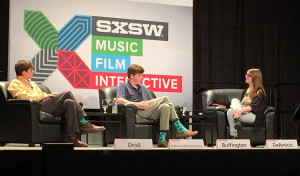 SXSW Interactive saw Yik Yak founders Tyler Droll and Brooks Buffington sitting down Monday with Carmel DeAmicis of GigaOm for what DeAmicis called a rare interview.
SXSW Interactive saw Yik Yak founders Tyler Droll and Brooks Buffington sitting down Monday with Carmel DeAmicis of GigaOm for what DeAmicis called a rare interview.
This is the first SXSW experience for both founders, who related that a year ago they were still working furiously on the app and probably wouldn’t have believed they would be presenting at Interactive twelve months later.
Yik Yak is an anonymous location-based social media app popular on college campuses. The app functions similarly to twitter in that users publish small posts but the difference lies in the complete lack of usernames. Instead of seeing what individual known users are seeing or doing, one sees the general chatter coming out of a location.
The founders listed as their main motivation for the app wanting to allow users to reach a large audience without committing to the arduous task of building a large following.
The app was the team’s third attempt at building together. In order to get more realistic feedback and break free from the glowing praise of friends and family who had downloaded previous attempts, and for a cheeky take on the Facebook origin story, the duo told students at South Carolina’s Furman University that the app had started with Harvard students. The ploy worked – the app took off quickly.
From there their growth strategy was particularly original. They tracked down lists of student organizations on various college websites and emailed every officer belonging to the larger groups telling them they should be using Yik Yak because their rival school was. The unconventional tactic proved incredibly effective.
Though they told Furman students the app started at Harvard, they maintained that Furman was the perfect testing ground for such technology. The students at Furman are more representative of the average college student, which the team says is much more their audience than the super tech-savvy Stanford and MIT students who have been targeted by, and who have launched, apps in the past.
“I’m sure the kids at Stanford are completely tired of hearing about new apps,” Buffington laughed, adding that the novelty factor for the Furman students was another part of their success.
DeAmicis questioned the pair extensively on their decision to keep their operations in Atlanta, but they shrugged off what seemed like concern on her part, maintaining that novelty was again on their side in terms of finding and building a workforce.
“Not every engineer is from California,” Droll added. He continued that the ability to live and work closer to the east coast was what attracted many of their employees.
A large part of the panel focused on the many claims of cyber-bullying that have been levied at the app and its founding team. Both Droll and Buffington said they take the issue very seriously and it was a part of the reason they completely removed Yik Yak from high school campuses.
Droll explained that in the end they meant the app to be for college-age users. There’s a level os psychological maturity that just isn’t there in high school, he added. The founders and their team geo-fenced every high school in the country, over 100,000, so that the app will not work on or near a high school campus.
“We don’t want growth at all cost. We want good growth with good users,” Droll said.
The pair were close-lipped about strategies to monetize the app or future plans for expansion. They did, however, share with the audience their belief that the app could have potential for journalist and those in the media.
